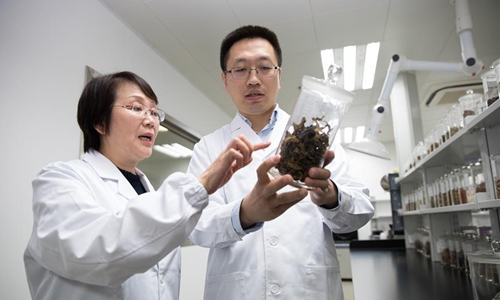HOME >> CHINA
Initial probe clears Chinese Alzheimer's drug developer of academic fraud
Source:Global Times Published: 2019/11/30 15:52:08

Photo: Xinhua
A preliminary probe by the Shanghai Institute of Materia Medica under the Chinese Academy of Sciences (CAS) acquitted Geng Meiyu, the lead developer of the drug GV971 for Alzheimer's disease, of academic fraud, Shanghai-based Wenhui Daily reported on late Friday.
The only study paper involving GV971 and other papers published in the journal, Cell, are free from any thesis fraud, the institute said.
Though some original images were selected incorrectly in the remaining three papers published in the Hepatology and other journals, there was no evidence of image stitching and forgery, and the final scientific conclusion of the paper was not affected. The author of the paper has sent a corrigendum application to the relevant journal, according to the report.
Li Jia, director of the institute, told the Wenhui Daily they will actively cooperate with the third-party authorities for verification.

Photo: Xinhua
Geng Meiyu, Pei Gang and Li Hongliang were accused of academic fraud in a letter from Rao Yi, principal of the Capital Medical University, published Friday on the WeChat public account of Dingxiangyuan, an influential and popular online medical forum in China. Rao claimed that Geng Meiyu, the lead developer of the drug GV971 for Alzheimer's disease, was engaged in research paper fraud related to the drug.
Pei Gang was accused of thesis fraud for his 1999 publication Ling et al., PNAS 96:7922-7927. Li Hongliang, director, Wuhan University School of Basic Medical Science, has been accused of academic misconduct spanning 17 years in the letter.
CAS Center for Excellence in Molecular Cell Science, a research institute to which Pei Gang's research team is attached, told Wenhui they have paid high regard to the case, and have been organizing personnel to launch a preliminary investigation on the paper, and will actively cooperate with the third-party authorities for verification.
No response from Li's side as of press time.
The Beijing News reported that the National Natural Science Foundation of China is investigating the matter.
The National Medical Products Administration in China approved GV971 to treat mild to moderate AD and improve cognitive conditions earlier in November. GV971 is the first such drug approved globally in 17 years.
Posted in: SOCIETY